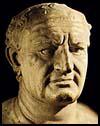Suetonius

Gaius Suetonius Tranquillus, the son of Suetonius Laetus, was probably born in Hippo, Regius (Algeria) in about AD 69. Suetonius trained as a lawyer and, after a succession of jobs working for the Roman government.
Suetonius was a close friend of Pliny the Younger who described him as "quiet and studious, a man dedicated to writing." Pliny, who inherited a large sim of money from Pliny the Elder, helped him buy a small property in Italy.
Suetonius served under Pliny the Younger in Bithynia Pontus (northern Asia Minor) between 110 and 112. Pliny introduced Suetonius to Emperor Trajan. Later, Suetonius served as secretary of studies and director of the government archives. Suetonius also served as chief secretary to Emperor Hadrian. These posts gave him access to documents that enabled him to write his most famous book, The Twelve Caesars (a collection of biographies of the twelve Roman Emperors who lived between 48 BC and AD 96).
Suetonius believed that historians should try to write unbiased books. He included information for and against the people he was writing about and tried to avoid making personal judgements about them. However, one of the themes of his biographies was that emperors started off with good intentions but ended up being corrupted by their tremendous power.
Suetonius has been criticised by modern historians for relying too much on gossip and rumour. It has been argued that, as many of the anecdotes (interesting and amusing short stories) that he included dealt with personal incidents that took place a long time before he was born, they could not be checked for accuracy.
In 122, Emperor Hadrian dismissed Suetonius for disrespectful behaviour towards Empress Vibia Sabina. Suetonius retired and is believed to have died in about AD 130.
Primary Sources
(1) Suetonius, The Twelve Caesars (c. AD 110)
Julius Caesar's public shows were of great variety... Wild-beast hunts took place five days running, and the entertainment ended with a battle between two armies, each consisting of 500 infantry, twenty elephants, and thirty cavalry... Such huge numbers of visitors flocked to these shows from all directions that many of them had to sleep in tents pitched along the streets or roads, or on roof tops; and often the pressure of the crowd crushed people to death.
(2) Suetonius, The Twelve Caesars (c. AD 110)
Caesar was a most skillful swordsman and horseman, and showed surprising powers of endurance. He always led his army, more often on foot than in the saddle, went bareheaded in sun and rain alike, and could travel for long distances at incredible speed... If Caesar's troops gave ground he would often rally them in person, catching individual fugitives by the throat and forcing them round to face the enemy again... He always addressed his soldiers not with "My men", but with "Comrades" ... which put them into a better humour. He fixed the daily pay of the regular soldiers at double what it had been... and occasionally gave each man a slave.
(3) Suetonius, The Twelve Caesars (c. AD 110)
Augustus' eyes were clear and bright... his teeth were widely separated, small and dirty. His hair was slightly curly and yellowish. His ears were small. His nose protruded somewhat at the top and bent rather inwards at the bottom. He was short (although his freedman Julius Marathus, who kept his records, informs us that he was over five feet six inches in height), but this was disguised by the good proportions of his figure and only apparent if someone taller stood beside him.
(4) Suetonius, The Twelve Caesars (c. AD 110)
There are also letters of his to Cicero, as well as to his intimates on private affairs, and in the latter, if he had anything confidential to say, he wrote it in cipher, that is, by so changing the order of the letters of the alphabet, that not a word could be made out. If anyone wishes to decipher these, and get at their meaning, he must substitute the
fourth letter of the alphabet, namely D, for A, and so with the others.
